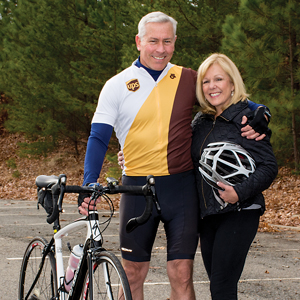Rick Schoepke couldn’t figure out why he was having trouble seeing out of his left eye. Perplexed by the sudden onset, he decided to make a doctor’s appointment. After a battery of tests that included a spinal tap and MRI, doctors determined he had optic neuritis, an inflammation of the optic nerve associated with multiple sclerosis. “That was the only symptom I had,” says the Chesterfield resident.
Multiple sclerosis is an immune-mediated disorder of the central nervous system, which includes the optic nerves, brain, and spinal cord. Often unpredictable, MS can be disabling. “The cause, or causes, of MS are still not known, but it is felt to likely be an interplay between genetic factors and environmental factors,” says Alan Schulman, MD, of Neurological Associates, who also serves on the board of the MS Society.
Fifty-eight-year-old Rick didn’t know much about MS before his diagnosis in 2002. The news he received was jarring, but instead of feeling defeated by the diagnosis, he accepted it as a challenge to fight MS. “I have a strong faith in God and this is something I had to take on.
I had to challenge it. I found out it could be manageable,” he says. “I started taking medicine right away, and I started a more balanced nutritional diet. I exercised and I rested regularly.”
He also tried to minimize his stress level by adopting a positive attitude toward his situation. Rick believes the steps he’s taken has helped slow the progression of the disease. “I will occasionally have a setback. I have some numbness in my feet and I do experience some muscle tightness. I also have some balance problems,” he says.
The right side of his body is a little weaker than the left and he does get fatigued from time to time. “But if you look at me, I look pretty normal,” he says.
Rick hasn’t let the disease slow him down. In fact, he’s used the disease as motivation to complete a triathlon, half marathon, the Ukrop’s Monument Avenue 10k, and at least a half-dozen century bike rides. (Yes, that’s a hundred miles in a day.) “This year for Bike MS: Ride Virginia, I did a double century. I rode a hundred miles on Saturday and a hundred miles on Sunday,” he says, noting that Bike MS: Ride Virginia is an annual event benefiting the MS Society.
When he competed in the back-to-back century rides, members of his family were there to cheer him on. “It was nice to see them when I finished,” he says.
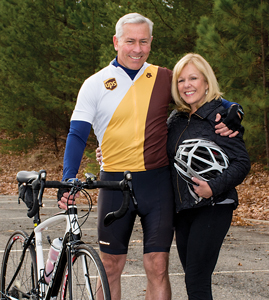
This father of two sons – Ricky, 27, and Ryan, 25 – is proud of his family’s support. “My oldest son, Ricky gathered all his friends and they contributed financially to my MS bike ride fundraiser,” Rick says. “Ryan has ridden with me in Ride Virginia for the past three years. And my wife, RoseMarie, volunteers for the MS Society. Everybody has been positive and very encouraging. They are there with any support that I might need.” His brother, Tim, has also traveled from Baltimore to take part in the race.
Most people with MS are diagnosed between the ages of twenty and fifty. “The disease is more common among Caucasians of northern European ancestry, and it affects women significantly more than men,” says Dr. Schulman.
Even though it isn’t common, the disease can affect the elderly. If it occurs in an older patient, there could be a “more rapid course of disability,” says Thomas Smith, MD, with Bon Secours Neurology Clinic at Memorial Regional Medical Center in Mechanicsville.
There are different forms of MS, but the majority of people with the disease have what’s called relapsing-remitting MS. Episodes of symptoms (or relapses) can last days to weeks. “Then they will return to baseline or close to baseline,” says Dr. Schulman. “People with MS can have many different neurological symptoms, including weakness, difficulty walking, sensory symptoms, and cognitive issues.”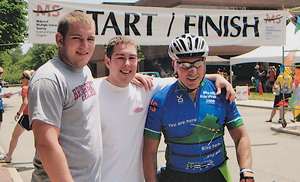
They can also experience numbness, tingling, double vision, vertigo, or difficulty swallowing or speaking. “It can affect almost any part of the brain,” says Dr. Smith. “With time, it transforms from the relapsing form to a more progressive stage. It’s quite a variable disease.”
MS affects more than 2.3 million people worldwide. It is estimated that it affects up to 400,000 people in the United States and it is the number one cause of disability in young people. According to the MS Society, the disease is thought to be triggered in a genetically susceptible individual by a combination of one or more environmental factors. It is not contagious, nor is it directly inherited. “But if one person in your family has it, your chances of having it can go up,” says Dr. Smith.
There is no single test to determine if you have MS. Doctors use several tests, including the MRI scan of the brain and spinal tap that Rick had during the course of his diagnosis. “An MRI of the brain and also the cervical spine is the best test to give us an idea,” Dr. Smith says.
While there have been disease-modifying therapies for MS since the early 1990s, “there has been a tremendous amount of MS research and clinical trials in recent years,” says Dr. Schulman. “There are now injection treatments, pill treatments, and infusion treatments for the relapsing forms of the disease.”
A less common form of MS, called primary progressive MS (where people don’t have relapses), still does not have an approved treatment. “There are ongoing clinical trials for PPMS,” says Dr. Schulman.
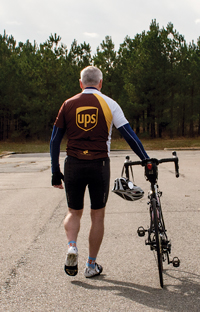
The first oral pill treatment was introduced about four years ago. “Now we have three pill forms,” says Dr. Smith. “The pills help suppress the immune system. The injectable therapies also work with the immune system.”
Researchers are working on other injectables and pill forms now. “In a couple of years we will have more therapies,” Dr. Smith says. “This is an exciting stage. For fifteen years, we only had four standard therapies. Now there are a lot more options available.”
Rick takes a weekly injection of the drug Avonex. “I believe that has helped,” he says. “I don’t think there is any one thing that is the key, but medicine is a big key.
The use of vitamin D has also proven helpful for people with MS. “In a lot of degenerative neurologic diseases, there is a lack of vitamin D,” Dr. Smith says. “It has a benefit on the muscles. It also helps keep the heart in shape.”
A study noted by Dr. Smith showed that people with normal levels of vitamin D were not as likely to get MS. “And if they had MS, they were less likely to experience a relapse,” he says.
According to Smith, across the population, two-thirds of all women and one half of all men are deficient in vitamin D. Most MS experts recommend that people who are low in vitamin D take 2,000 units of D3 each day. “But that depends on your level. You don’t want to get too much Vitamin D because it is fat soluble,” Smith says. “If your levels are too low, you may have to take 50,000 units but that is a prescription dose.”
Doctors also recommend physical activity to help maintain muscle strength. “If you are stronger and fitter, you will do better with this disease,” Smith says.
And that has been Rick’s philosophy. “I do what I can do to control it,” he says. “I challenge myself every day and I take life one day at a time. You have to be positive and optimistic. Everybody has been very positive and encouraging and has been there with any support that I may need.
All of that continues to help me fight.”

The MS Society at Work
The National MS Society funds cutting-edge research and also provides programs and services designed to help people with MS and their families. In 2013 alone, the society invested $46 million to support 380 research projects around the world. Programs and services provided assisted more than one million people.
The Central and Eastern Virginia Chapter of the National Multiple Sclerosis Society serves a combined total of 5,600 individuals with MS and their families in Central and Eastern Virginia. The chapter leads education initiatives and provides assistance to help those with MS and their families.
Programs offered include financial assistance, transportation assistance, information and referral, self-help groups, educational programs for those with MS and for professionals, short-term counseling, advocacy, and a children’s camp.
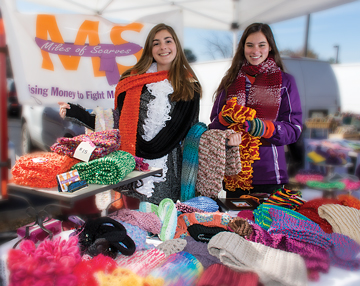
Teens Take on Multiple Sclerosis – with Knitting Needles
Meredith Polk of Henrico was just ten years old when she launched Miles of Scarves for MS in 2009. She and a group of fifteen friends knit scarves and sell them at MS events and craft fairs. They get together every Friday to knit for a couple of hours “and eat cookies,” she says. “It takes about a week or two to finish a scarf.”
All of the funds from sales go to the MS Society except for the amount she reserves to buy yarn to make the scarves.
Now fifteen and a sophomore at Maggie L. Walker Governor’s School for Government and International Studies, the public magnet high school in Richmond, Meredith says the seed for the effort was planted after reading a magazine article about the world’s largest scarf that had been knitted for charity. She had been knitting since she was five. “I got my friends together and decided to make scarves for the MS Society,” she says. “My mom and dad had participated in the Bike MS rides, and my grandparents’ friend had MS. I saw how it impacted his family.”
The money Meredith’s group raises supplies food and water at a rest stop for Bike MS. She also gives money to families with MS during the holidays. “We also make cookies for the riders and volunteers at a rest stop,” she says.
The scarves she and her friends knit range from $10 to $30. Miles of Scarves sells an average of two hundred scarves a year. “We have all sorts of colors and different yarn types,” she says. “We have twirly scarves, thicker woolish ones, and infinity scarves, all in different patterns.”
Miles of Scarves has raised more than $22,000 since they started. Each year, they sponsor a $2,000 scholarship for a graduating senior who has a parent with MS in Central Virginia. “We partner with the MS Society to decide who it should go to,” she says of the scholarship. “We are also giving money to research for a specific project being conducted by Dr. Unsung Oh at VCU. We have donated $2,500 toward the project, but the total cost is $44,000 and we are challenging other people to donate to that project.”
Sherri Ellis, head of MS Richmond chapter, sees the impact Meredith and her friends are making on people living with MS. “They are funding research that is necessary for better treatment and ultimately to find a cure,” she says. “They are actively engaged in making an incredible impact. I believe in their lifetime they will see significant results due to their work and fundraising.”
In November, Meredith traveled to Washington, DC, to receive an award from the Association of Fundraising Professionals. She was the overall winner in the youth category for the National Philanthropy Day awards.
“We got nominations from across North America,” says Michael Nilsen, spokesperson for the Association of Fundraising Professionals. “She [Meredith] was an outstanding example of a self-starter. We were very impressed that Miles of Scarves is a self-sustaining model and it can be replicated.” Nilsen offered that while Meredith and her team might graduate from the knitting circle one day, others could easily take up the needles. “To have that infrastructure to keep the work going was something we look for. It shows that philanthropy knows no age.”
Meredith’s current goal is to bring some younger kids into the group and to hopefully start other groups. There is already a Meters of Scarves group in Canada. “They had heard about us and started a group based on us,” Polk says. “I would like to take it to other states as well.”
With today’s emphasis on inspiring public and private school students to engage in community service, Meredith believes Miles of Scarves
has been a solid example of the success of that initiative.
“Miles of Scarves is where I get most of my community service hours,” says Meredith, whose middle school also required students to record community service hours for graduation. “I’ve been able to get other kids involved through school. I think that community service requirements and programs through school are a great way to get kids involved with service and hopefully inspire them to start their own projects.”
Five years later, Meredith never imagined that Miles of Scarves would become such an important contributor to MS. “I am really proud of what we have been able to do,” she says. “It’s a fun way to spend time with friends and do something good.”


